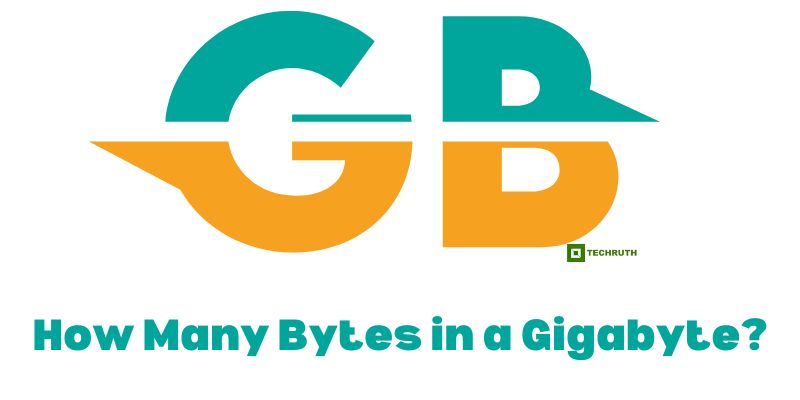In today’s digital age, we rely heavily on digital storage devices to store, share and access vast amounts of data. The amount of storage capacity available to us is usually measured in gigabytes (GB). However, have you ever wondered how many bytes are actually in a gigabyte? In this article, we will explore the answer to this question and look at why it matters.
What Is A Byte?
A byte is a unit of digital information that consists of 8 bits. A bit is the smallest unit of digital information that can be stored or transmitted and can represent a binary value of either 0 or 1. A byte, therefore, consists of 8 of these bits and can represent 256 different values (2 to the power of 8).
What Is A Gigabyte?
A gigabyte (GB) is a unit of digital information that represents 1 billion bytes. Specifically, a gigabyte is equal to 1,073,741,824 bytes. It is often used to describe the storage capacity of digital devices such as hard drives, USB drives, and memory cards.
A gigabyte (GB) is a unit of digital information storage, commonly used to describe the capacity or size of computer files, documents, images, videos, and other types of data. One gigabyte is equivalent to 1,000 megabytes (MB) or 1 billion bytes of information. To give you an idea of what a gigabyte can hold, it can store approximately:
- 250 songs (at 4 minutes per song)
- 1,000 photos (at 1 MB per photo)
- 1 hour of standard definition video (at 1.5 GB per hour)
- 15 minutes of high-definition video (at 1 GB per 5 minutes)
Of course, the actual amount of data that can be stored in a gigabyte depends on various factors such as the file type, compression, resolution, and other technical specifications.
How Many Bytes Are in a Gigabyte?
There are 1 billion bytes in a gigabyte. In terms of binary notation, a gigabyte is equal to 2^30 bytes, which is approximately 1.07374 billion bytes. However, in most practical applications, the term “gigabyte” is used interchangeably with the value of 1 billion bytes.
It’s worth noting that there can be some confusion when it comes to the exact number of bytes in a gigabyte, as some computer storage devices and operating systems may use different definitions or rounding conventions. Additionally, the capacity of a storage device may be slightly less than its advertised value due to formatting and other factors.
Why Does It Matter?
Understanding the relationship between bytes and gigabytes is important when it comes to choosing and using digital storage devices. For example, if you are looking to store large files such as high-definition videos or high-resolution photos, you will need a storage device with a high capacity of gigabytes. Conversely, if you only need to store small text documents or low-resolution images, a smaller storage capacity device would suffice.
Another important factor to consider is the speed of data transfer. The larger the file size, the longer it takes to transfer it from one device to another. This means that if you need to transfer large files frequently, you should opt for storage devices with higher data transfer speeds.
How Much Data Is One Gigabyte?
One gigabyte (GB) of data is equivalent to 1,000 megabytes (MB) or 1 billion bytes.
In terms of how much data one GB can hold, it depends on the type of data and the format of the file. Here are some examples:
- About 250 songs in MP3 format (at an average of 4 MB per song)
- Around 1,000 photos in JPEG format (at an average of 1 MB per photo)
- Approximately 45 minutes of standard-definition video (at an average of 22 MB per minute)
- Roughly 15 minutes of high-definition video (at an average of 70 MB per minute)
It’s important to keep in mind that these are just rough estimates and actual file sizes may vary depending on a variety of factors such as compression, resolution, and encoding format. Additionally, the amount of data that can be stored on a device may be slightly less than its advertised capacity due to formatting and other factors.
You might also like to read
Top 10 Tips to Improve Mac Performance
How To Stop Google Virus Warning Android?
FAQ’s
Q:- How many bits are in a gigabyte?
Ans:- There are 8 billion bits in a gigabyte. This is because there are 8 bits in a byte, and a gigabyte is equal to 1 billion bytes.
Q:- How many kilobytes are in a gigabyte?
Ans:- There are 1 million kilobytes in a gigabyte. This is because there are 1,000 kilobytes in a megabyte, and 1,000 megabytes in a gigabyte.
Q:- How many gigabytes are in a terabyte?
Ans:- There are 1,000 gigabytes in a terabyte. This is because there are 1,000 megabytes in a gigabyte, and 1,000 gigabytes in a terabyte.
Q:- How much storage can a gigabyte hold on a computer?
Ans:- The amount of storage that a gigabyte can hold on a computer depends on the type of data being stored and the file format. However, as a rough estimate, a gigabyte can hold approximately 250 songs in MP3 format, 1,000 photos in JPEG format, 45 minutes of standard-definition video, or 15 minutes of high-definition video.
Q:- Why do hard drives and storage devices sometimes have slightly less storage than their advertised capacity?
Ans:- This is because storage device manufacturers use decimal notation to describe capacity, while computers use binary notation. For example, a manufacturer may advertise a hard drive with a capacity of 1 terabyte, but in binary notation, this is equal to 931 gigabytes. Additionally, some storage space is used for formatting and other overhead.
Conclusion
In conclusion, a gigabyte is a unit of digital information that represents 1 billion bytes. Understanding this relationship is important when it comes to choosing and using digital storage devices. It allows you to select a device with the appropriate storage capacity and data transfer speed for your needs. Whether you are storing large video files, high-resolution photos, or just small text documents, knowing how many bytes are in a gigabyte is an essential piece of knowledge.







